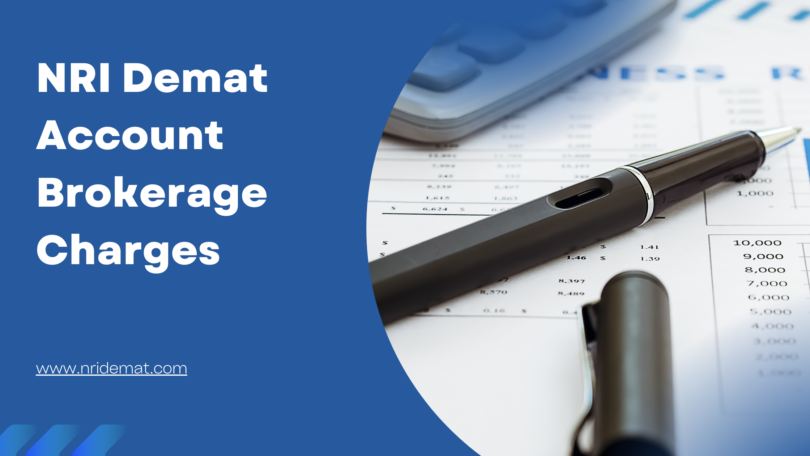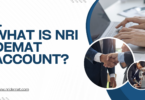If you are a Non-Resident Indian (NRI) interested in investing in the Indian stock market, then you must open an NRI Demat account. This account will allow you to hold securities in electronic form, making it easy for you to trade in Indian stocks.

Brokerage charges for NRI Demat accounts vary from broker to broker. These charges can include account opening charges, annual maintenance charges, and Good and Service Tax (GST).
The account opening charges can range from Rs 300 to Rs 4,000. Meanwhile, the annual maintenance charges can range from free for the first year to Rs 600 plus GST for subsequent years.
In addition to brokerage charges, there may be additional costs and taxes associated with NRI Demat accounts. For example, there may be charges for using the Portfolio Investment Scheme (PIS), which is required for NRIs to invest in the Indian stock market.
It is important to understand these costs and taxes before opening an NRI Demat account.
Understanding NRI Demat Account
If you are a Non-Resident Indian (NRI) and looking to invest in Indian securities, you need to open an NRI Demat account. This account allows you to hold your securities in electronic form. Here are some essential things you should know about NRI Demat account:
Eligibility Criteria for NRIs
To be eligible for an NRI Demat account, you need to meet the following criteria:
- You must be an NRI as per the definition provided by the Reserve Bank of India (RBI).
- You should have an Indian PAN card.
- You need to have an NRE or NRO account with a bank in India.
Types of NRI Demat Accounts
There are two types of NRI Demat accounts:
- Non-PIS Demat Account: This account is for NRIs who do not want to trade in the Indian stock market using a Portfolio Investment Scheme (PIS). You can invest in Indian mutual funds, bonds, and other securities using this account.
- PIS Demat Account: This account is for NRIs who want to trade in the Indian stock market using a Portfolio Investment Scheme (PIS). To open this account, you need to apply for a PIS permission letter from your bank. You can invest in Indian equities and derivatives using this account.
It is essential to note that the charges associated with NRI Demat accounts vary from broker to broker. The charges include account opening fees, annual maintenance fees, brokerage fees, and other charges.
It is advisable to compare the charges of different brokers before opening an NRI Demat account.
Brokerage Charges for NRI Demat Accounts
If you are a Non-Resident Indian (NRI) looking to trade in Indian stocks, you will need to open a Demat account with a brokerage firm. However, before you do so, it is important to understand the brokerage charges associated with opening and maintaining a Demat account.
Equity Trading Charges
Brokerage charges for equity trading refer to the commission charged by the broker for executing buy and sell orders.
The charges can vary from broker to broker. Some brokers charge a flat fee per order, while others charge a percentage of the total transaction value.
For NRI Demat accounts, the brokerage charges for equity trading can range from 0.1% to 1% of the turnover or 25 paise per share, whichever is higher.
In addition to brokerage charges, NRI traders may also need to pay Securities Transaction Tax (STT) of 0.1% on the total transaction value.
Derivative Trading Charges
Derivative trading refers to trading in futures and options contracts. Similar to equity trading, brokerage charges for derivative trading can vary from broker to broker.
Some brokers charge a flat fee per order, while others charge a percentage of the total transaction value.
For NRI Demat accounts, the brokerage charges for derivative trading can range from Rs. 100 to Rs. 200 per executed order.
In addition to brokerage charges, NRI traders may also need to pay other charges such as Exchange Transaction Charges (ETC) and Clearing Charges.
Comparing Brokerage Firms
As an NRI looking to invest in India, it is important to compare brokerage firms to find the best one for your needs. Here are some of the top brokerage firms for NRIs and the factors that affect their brokerage fees.
Top Brokerage Firms for NRIs
- ICICI Direct – ICICI Direct is a popular choice for NRIs due to its 3-in-1 account that combines a trading account, demat account, and bank account. They offer a range of investment options, including equities, derivatives, mutual funds, and IPOs. Their brokerage fees start at 0.75% for equity delivery trades.
- HDFC Securities – HDFC Securities is another top choice for NRIs, offering a 3-in-1 account and a range of investment options. They have a flat brokerage fee of 0.50% for equity delivery trades.
- Kotak Securities – Kotak Securities offers a 3-in-1 account and a range of investment options, including equities, derivatives, and mutual funds. Their brokerage fees start at 0.49% for equity delivery trades.
Factors Affecting Brokerage Fees
- Investment Amount – The investment amount can affect brokerage fees, with some firms charging a percentage of the investment amount as a fee.
- Type of Investment – Different types of investments may have different brokerage fees, with some firms charging higher fees for derivatives or mutual funds.
- Account Type – The type of account you have can also affect brokerage fees, with some firms offering lower fees for 3-in-1 accounts.
- Brokerage Plan – Some firms offer different brokerage plans with varying fees, so it is important to compare plans to find the best one for your needs.
- Additional Charges – Some firms may charge additional fees for services such as research or advisory services, so it is important to factor in these charges when comparing brokerage firms.
Additional Costs and Taxes

Account Maintenance Charges
Apart from the brokerage charges, you will also have to pay account maintenance charges for your NRI demat account. These charges are usually in the form of an annual fee and are charged by the depository participant (DP) who maintains your demat account.
The amount of account maintenance charges may vary depending on the DP you choose.
Securities Transaction Tax
In addition to the brokerage and account maintenance charges, you will also have to pay Securities Transaction Tax (STT) when you transact in securities.
STT is a tax levied by the Indian government on the purchase and sale of securities listed on the Indian stock exchanges.
The tax is charged as a percentage of the transaction value and is payable by both buyers and sellers.
The rate of STT varies depending on the type of transaction. For example, the STT rate for equity delivery trades is 0.1% of the transaction value for both buyers and sellers. Meanwhile, the STT rate for equity intraday trades is 0.025% of the transaction value for both buyers and sellers.
It is important to note that STT is not applicable on mutual fund transactions or on the purchase and sale of securities listed on foreign stock exchanges.
Frequently Asked Questions

How do I calculate brokerage charges for an NRI demat account?
The brokerage charges for an NRI demat account are calculated based on the type of trade, the volume of trade, and the broker’s commission structure.
Some brokers charge a flat fee per order, while others charge a percentage of the total transaction value.
It is important to carefully review the broker’s commission structure to understand how the brokerage charges are calculated.
What are the typical charges for an NRI demat account with Zerodha?
Zerodha is a popular discount broker in India. The charges for an NRI demat account with Zerodha include an account opening fee, annual maintenance charges, and brokerage charges.
The account opening fee is a one-time fee that ranges from Rs 200 to Rs 300. Meanwhile, the annual maintenance charges range from Rs 100 to Rs 500 per year.
The brokerage charges for NRI trading with Zerodha are 0.1% or Rs 200 per executed order, whichever is lower.
What fees does ICICI charge for their NRI demat account services?
ICICI Direct is a popular full-service broker in India. The fees for an NRI demat account with ICICI Direct include an account opening fee, annual maintenance charges, and brokerage charges.
The account opening fee ranges from Rs 500 to Rs 1,000. Meanwhile, the annual maintenance charges range from Rs 450 to Rs 2,000 per year.
The brokerage charges for NRI trading with ICICI Direct are 0.75% for delivery trades and 0.05% for intraday trades.
How does Angel One structure its brokerage charges for NRIs?
Angel One is a full-service broker in India. The brokerage charges for NRI trading with Angel One are calculated based on the type of trade, the volume of trade, and the broker’s commission structure.
The brokerage charges for delivery trades range from 0.3% to 0.5. For intraday trades, it ranges from 0.05% to 0.1. The broker also charges an account opening fee and annual maintenance charges.
Is there a difference in demat account charges for NRIs between various brokers in India?
Yes, there is a difference in demat account charges for NRIs between various brokers in India. The charges for NRI demat accounts vary based on the broker’s commission structure, account opening fee, annual maintenance charges, and other fees.
It is important to compare the charges of different brokers before opening an NRI demat account.
Are NRIs allowed to operate a regular demat account in India?
Yes, NRIs are allowed to operate a regular demat account in India. However, they need to open a special NRI demat account to trade in Indian securities.
The NRI demat account is designed to comply with the regulations of the Reserve Bank of India and the Securities and Exchange Board of India.





